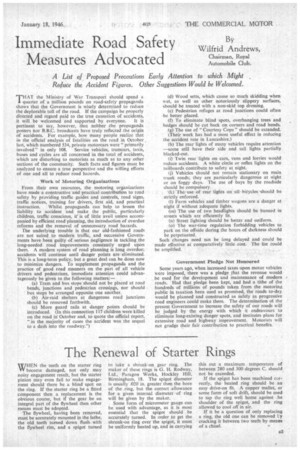Immediate Road Safety Measures Advocated
Page 29

If you've noticed an error in this article please click here to report it so we can fix it.
A List of Proposed Precautions Early Attention to which Might . Reduce the Accident Figures. Other Suggestions Would be Welcomed.
By Wilfrid Andrews,
Chairman, Royal Automobile Club.
THAT the Ministry of War Transport should spend a 1 quarter of a million pounds on road-safety propaganda shows that the Government is wisely determined to reduce the deplorable toll of the road. If the campaign be properly directed and regard paid to the true causation of accidents,
it will be welcomed and supported by everyone. It is pertinent to say, however, that neither )the propaganda posters nor B.B.C. broadcasts have truly reflected the origin of accidents. For example, how many people realize that in the official analysis of fatalities on the road in October, last, which numbered 534, private motorcars were "primarily
involved" in only 108. Service vehicles, tramcars, taxis, buses and cycles are all concerned in the total of accidents, which are disturbing to motorists as much as to any other sections of the community. Such facts and figures must be analyzed to ensure a true perspective and the willing efforts of one and all to reduce road hazards.
Work of Motoring organizations From their own resources, the motoring organizations have made a constructive and -practical contribution to road safety by providing traffic guides and controls, road signs, traffic notices, training for drivers, first aid, and practical
instruction. Whilst propaganda can help to lessen the liability to accident and make the public, particularly children, traffic conscious, it' is of little avail unless accompanied by efficient road planning, the introduction of overdue reforms and the removal of unnecessary road hazards.
The underlying trouble is that our old-fashioned roads are not suited to modern traffic, and successive Governments have been guilty of serious negligence in tackling the long-needed road improvements constantly urged upon them. A modern system of road planning is long overdue; accidents will continue until danger points are eliminated. This is a long-term policy, but a great deal can be done now to minimize dangers. To supplement propaganda and the practice of good road manners on the part of all vehicle drivers and pedestrians, immediate attention could advantageously be given to the following matters:— (a) Tram and bus stops should not be placed at road bends, junctions and pedestrian crossings, nor should bus stops be arranged opposite one another.
(b) Air-raid shelters at dangerous road junctions should be removed forthwith.
(c) More guard rails at danger points should be introduced. (In this connection 117 children were killed on the road in October and, to quote the official report, " in the majority of cases the accident was the sequel to a dash into the roadway.") (d) Wood setts, which cause so much skidding when wet, as well as other notoriously slippery surfaces, should be treated with a non-skid top dressing.
(e) Pedestrian refuges at road junctions could often be better placed.
(f) To eliminate blind spots, overhanging trees and hedges should be cut back on corners and road bends.
(g) The use of "Courtesy Cops" should be extended. (Their work has had a most useful effect in reducing the accident rate in Lancashire.) (h) The rear lights of many vehicles require attention —some still have their side and tail lights partially blacked-out.
(i) Twin rear lights on -cars, vans and lorries would reduce accidents. A white circle or reflex lights on the tailboards contribute to safety at night.
(j) Vehicles should not remain stationary on main trunk roads; they are particularly dangerous at night or on foggy days. The use of bays by the roadside should be compulsory. • (krThe use of rear lights on allbicycles should be strictly enforced.
(I) Farm vehicles and timber wagons are a danger at night if without adequate lights.
(m) The use of two headlights should be banned in streets which are efficiently lit.
(n) Street lighting should be better and uniform.
(o) The war-time regulation forbidding vehicles to park on the offside during the hours of darkness should be perpetuated.
Such changes need not be long delayed and could be made effective at comparatively little cost. The list could be amplified.
Government Pledge Not Honoured
Some years ago, when increased taxes upon motor vehicles were imposed, there was a pledge that the revenue would be used for the development and maintenance of modern roads. Had that pledge been kept, and had a tithe of the hundreds of millions of pounds taken from the motoring public in taxation been used as promised, the roads to-day would be planned and constructed as gafely as progressive road engineers could make them. The determination ot the present Government to increase the safety of our roads will be judged by the energy with which it endeavours to eliminate long-existing danger spots, and institutes plans for extensive road and highway improvement. Motorists will not grudge their fair contribution to practical benefits.




























































